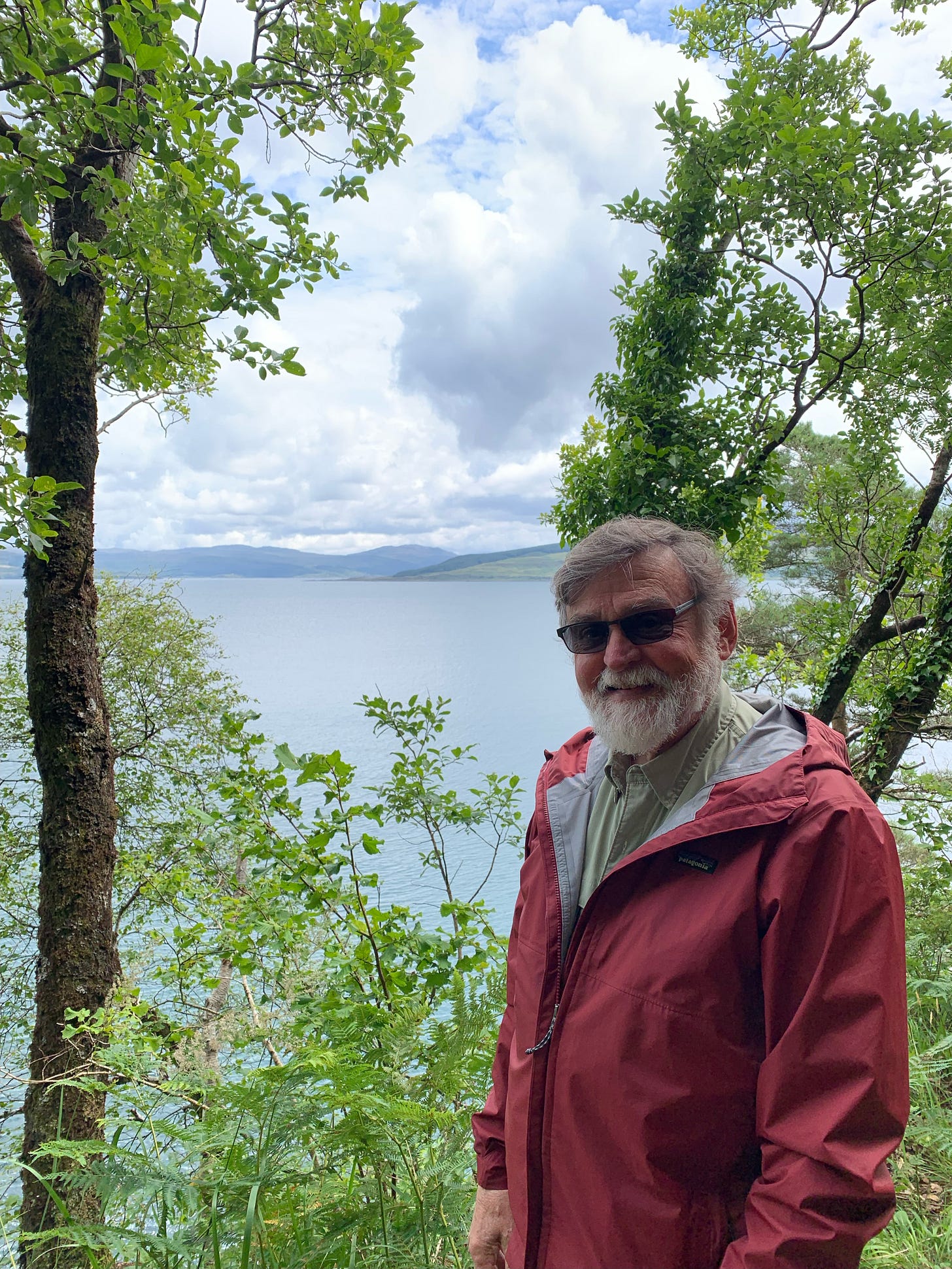Self-Awareness: Friend or Foe?
The lessons keep coming
Last summer around this time I was in Tobermory, Scotland, sitting on a bench at the edge of the Sound of Mull, gazing at the harbor filled with anchored boats resting quietly between me and the distant green hills on the other side. It was a sunny day with scattered small clouds overhead. Enough breeze was blowing to move the hairs on my arm with a gentle caress. It was one of those moments of ecstasy that brings wonder to my travels.
As I sat there I began to notice that the scene in front of me wasn't as bright as I thought it should be since the sun was shining with little interference. I wondered if my transition glasses could be having some impact so I took them off. If the brightness had been at maybe a seven while wearing them, it was suddenly a ten. My ecstasy increased by the same ratio. I don’t know why they had transitioned to sunglasses that darken the view from the inside out also.
I decided in that moment that I will never get transition lenses again. I want to see what is in front of me as it really is. My vision at a distance is still good, so the ecstasy I had already been feeling increased to match the increase in the brightness.
How much have I missed in the past without realizing it?
Self-awareness is reversing the lens through which we view the world and other people so that we can take a selfie. Should we put on the rose-colored view or the light-reducing view, the shades? Should we “accentuate the positive and eliminate the negative” (as urged by Bing Crosby and the Andrews’ Sisters)? Should we put on the shades so that we aren’t blinded by wishful thinking and illusions about ourselves? Should we look honestly at our shadow side in its various iterations?
The song adds and repeats again and again: “...and don’t mess with Mr. In-Between.”
So, apparently this is an either-or decision, at least according to Johnny Mercer who wrote the song in the early 1940’s after a friend returned from hearing Father Divine, the great Harlem Evangelist, preach a sermon titled, “Accentuate the positive and eliminate the negative.”
I am writing about this because I struggle with it. A single critical comment can linger and send out tendrils that overwhelm and engulf numbers of affirmations on the same matter rendering them impotent. It can find a spot in the stream of self-talk and never relinquish its place. Unfortunately my self-awareness is very often tuned to what other people are thinking about me. I understand intellectually that those people are actually thinking about themselves and not me.
Two things:
1. I didn’t know that when I was younger.
2. The scanner I currently use refuses my attempts at upgrades, it automatically reboots to the default setting. It seems ironic to me that I have for decades mentored and counseled very many people and helped them find their way through this very issue. (Physician, heal thyself! I would if I could.) I seem to be a relatively effective coach for others in their journeys through life. From some of them have come the accolades that my self-talk sabotages. There is truth both in the negative self-talk and the affirmations. If I believe the critics to be telling the truth, how can I treat the affirmations as lies? So that leads me to Mr. In Between, the one with whom we should most definitely not mess with, according to the song. That is where I am, messing with Mr. InBetween. I need the critics and the judgments both from others and my self-talk to balance the affirmations, but maintaining the balance is the challenge.
While trying to figure out what to say about managing self-awareness, Loren Eiseley came to my rescue. A recent Sunday Marginalian post by Maria Popova quoted this from his book, An Unexpected Universe:
To the degree that we let others project upon us erroneous or unbalanced conceptions of our natures, we may unconsciously reshape our own image to less pleasing forms. It is one thing to be “realistic,” as many are fond of saying, about human nature. It is another thing entirely to let that consideration set limits to our spiritual aspirations or to precipitate us into cynicism and despair. We are protean in many things, and stand between extremes. There is still great room for the observation of John Donne, made over three centuries ago, however, that “no man doth refine and exalt Nature to the heighth it would beare.”
Whether it is others’ views expressed directly or filtered through our negative self-talk there is space in between. We can set arbitrary limits on our aspirations or drift into a morass of cynicism and despair. In between those extremes, we are not bound to be who others or our self-talk say we are. We are protean, we are malleable, we are free to become who we choose to be. Donne adds, “nature is so far beyond us in its magnificence that there is plenty of room to grow.”
Easier said than done.
I want to see the shadow side of who I am clearly enough to stay grounded and learn from it without getting lost there. I want to bask in the glow of what I see through those rose-colored glasses, and embrace it without getting lost in it. One practice that helps when I think to use it is Mindfulness.
Mindfulness provides a crystal clear lens allowing me, if only for a moment, to look behind the stream of self-talk and the need for ego-caressing affirmations, behind the “I” listening to the self-talk to the simple unencumbered consciousness that is who I am.
That I exist is a miracle of nature.
That awareness provides a place of solace “in between” the positive and the negative, where they have no power to decide who I am.
READ THIS
I am including a link to the Marginalian post by Maria Popova from which I took the Eiseley quotations. The article and more of what he said caressed my spirit and refreshed me. As always Maria Popova’s words and the visuals are perfectly spoken and placed. The links expand possibilities for discovery and nurture.
This is a sort of Inside Out version of a Ted Talk, but her insights and the way she communicated really struck me. It seems very compatible with everything I discuss above. I hope you enjoy How to talk to the worst parts of yourself by Karen Faith.
The Destination is Now,
Peter





When we see clearly we can love dearly, both self and others. There's an ancient poem by 13th century Richard of Chichester, that made it into the 1971 musical "Godspell." Interesting back story how that evolved over time.
Thanks for sharing such an interesting story, Love this 🥰🥰🥰